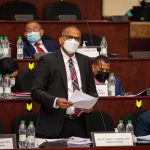
With the recent death of a Guyanese who contracted the H1N1 virus, Public Health Minister Dr. George Norton has pointed out that the Ministry immediately started dealing with the health care workers who were attending to this patient, as well as their relatives.
“Thus far, no one has come down with the signs or symptoms of that particular viral infection,” he said.
This statement was made by the Minister in an interview with the Government Information Agency (GINA). In terms of preparedness Dr. Norton noted that, “There is a tablet that we use and we have it available. There’s also a vaccine,” he said.
Currently, Trinidad and Tobago has a shortage of this tablet and they’re seeking help from Guyana with this first line of attack. Having sufficient, the Public Health Ministry has agreed to assist Trinidad by supplying the tablets.
With respect to the vaccine, it is not an antigen that is given routinely, the Health Minister explained. “This influenza like vaccine is done occasionally in times of crises, and we have not reached that stage where we would go and give the vaccination to everyone. However, not so long ago, Guyana has on record vaccinated 120,000 Guyanese, using that same vaccine; so if it becomes necessary we will do so, but so far we don’t have- there’s no need for that,” added.
Further, port health officers are fully aware of these preventative and treatment measures and are fully prepared to deal with any unpleasant situation.
“They are there present at the Timehri International Airport and the Ogle International Airport, along with the Moleson Creek crossing, the Lethem Bridge as well as Charity. But of course … we’ve got the porous border. The water is low in the Takutu River in the Ireng river and people are literally walking across those rivers. In all the different parts of the Rupununi like for instance, Achiwib and places like that, also in Region 8, in the Kanapang, Itaback areas, you have persons who cross that river just walking across,” he explained.
Symptoms of the H1N1 virus include coughing, fever, sore throat, body aches and headaches. It can only be transmitted if an infected person coughs or sneezes and thus releasing the virus infected particles into the air.
Citizens are urged to abstain from traveling to countries where the H1N1 virus is present unless it’s very necessary. (GINA)

















You must be logged in to post a comment Login